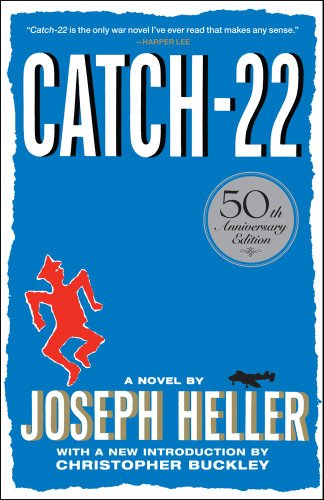All Nonfiction
- Bullying
- Books
- Academic
- Author Interviews
- Celebrity interviews
- College Articles
- College Essays
- Educator of the Year
- Heroes
- Interviews
- Memoir
- Personal Experience
- Sports
- Travel & Culture
All Opinions
- Bullying
- Current Events / Politics
- Discrimination
- Drugs / Alcohol / Smoking
- Entertainment / Celebrities
- Environment
- Love / Relationships
- Movies / Music / TV
- Pop Culture / Trends
- School / College
- Social Issues / Civics
- Spirituality / Religion
- Sports / Hobbies
All Hot Topics
- Bullying
- Community Service
- Environment
- Health
- Letters to the Editor
- Pride & Prejudice
- What Matters
- Back
Summer Guide
- Program Links
- Program Reviews
- Back
College Guide
- College Links
- College Reviews
- College Essays
- College Articles
- Back
Catch-22 by Joseph Heller
"That's some catch, that Catch-22," said Yossarian in Joseph Heller’s novel of the same now-popular phrase, Catch-22. Heller was inspired to write the book after his World War II experience, but only as a short story, originally titled Catch-18. The main character John Yossarian resembles the author in his views on death and religion among other things. The book jumps around between either the characters’ viewpoints or the timeframe almost every chapter, which can become confusing later into the book. Repetition can become monotonous, with entire pages seemingly duplicated, and characters whose name is Major Major Major, and whose rank is a Major, but for the most part it plays an important role in keeping thinks complicated and amusing.
There’s only one “catch” in reading this book, and that’s there more than just those pesky logic puzzles with no solution, there are paradoxes, cornelian dilemmas, and other similar chaotic mind-bending situations that compile on each other until in some places the reader has to stop and wonder just how these people function, and to figure out what exactly is going on. This of course is only compounded by the fact that all the main characters could be classified to some degree as insane, as crazy as the rules they are forced to follow set by the higher-ups. This is part of a theme addressed about the absolute power of the bureaucracy and how detached illogical it can be.
Yossarian and his fellow men are trapped in a cycle of flying endless perilous missions by the main “catch”, where if someone is crazy, they can ask the doctor to be relieved of duty, but upon requesting it, they are proved to be sane because it is assumed insane people do not fear for their lives. The men can also never finish their required number of missions to go home, because of a power-hungry commander who increases the number every time someone gets near competition, and not only needs them because of the shortage of pilots, but wants to stall so he can have more time in command to have a greater possibility of being promoted. At one point a murder plot is formed by a member of the group to stop the madness, but is abandoned because Yossarian does not advise it, even though he despises the commander and believes the commander is trying to kill him by sending him on endless missions.
People who enjoy war themed novels and comedic complicatedness of characters will almost certainly find this book great fun. In my opinion Catch-22 is an interesting read, the confusion makes it challenging, and with events such as the cook bombing his own base by accident it is quite addicting in a way. Simple yet powerful symbols also contribute to almost comedic nature of the book, such as Milo, the cook and greatly influential black market investor, selling chocolate covered cotton to the government, representing their inability to judge the inner morality of something by its looks. On a darker note, there is a man in a full body cast who dies, and is soon replaced by yet another unfortunate person, also in the white plaster prison. The people symbolize the government’s materialistic view of human life, a replaceable item in the grand scheme of war.
This historical fiction based on the authors life experiences is quite frank in many aspects of war, death, love, comradeship, but also has a lighter tone, one where there is always a hidden way out, that may have complications of its own, but anything is possible with enough determination and courage.
Similar Articles
JOIN THE DISCUSSION
This article has 0 comments.

